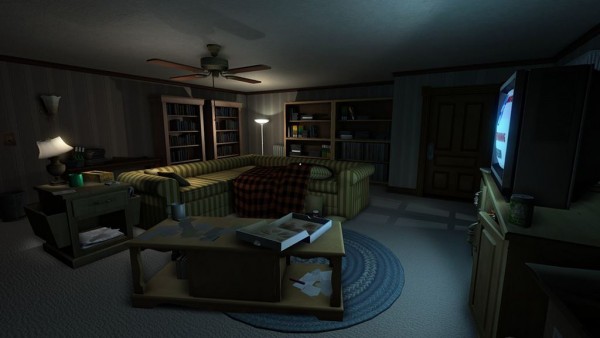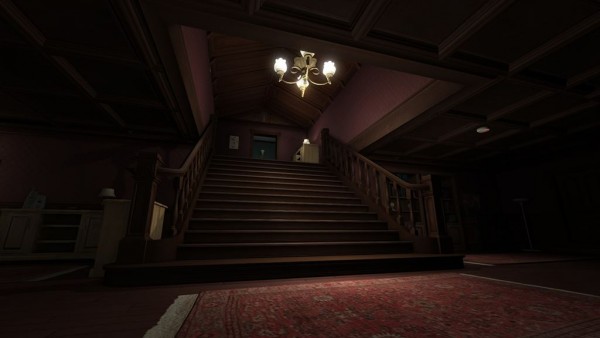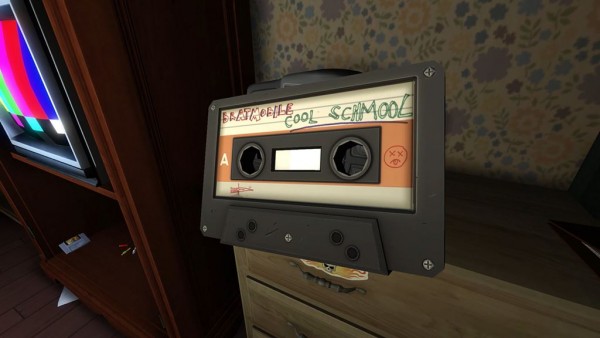Also On: Xbox One, PC
Publisher: Majesco
Developer: The Fullbright Company
Medium: Digital
Players: 1
Online: No
ESRB: M
I feel so conflicted about Gone Home. On the one hand, it was an undeniably great experience. It was emotionally affecting. It had some of the best writing I’ve ever seen (er, read) in a game. In a medium that’s not exactly known for nuance or intimacy or subtlety, it created a small, intimate portrait of a teenager, and it did so in a way that didn’t take shortcuts or rely on clich?s. For all those reasons and others which I’ll get to in a little bit, I think it’s the perfect answer to anyone who questions whether games can be mature in terms of their depth, rather than just in terms of how violent they can be.
That said, at the end of it, a tiny piece of me felt…I don’t know, cheated, in a way. I felt as if Gone Home hadn’t totally earned its ending. I felt like it built up a certain atmosphere, and that it made it seem as though everything was going in one direction, only for it to pull back at the last second and opt for something entirely different than it seemed to be hinting at for most of its narrative.
Even that caveat comes with a caveat of its own, however. If Gone Home had resorted to a sadder ending than the one it features, that probably would have been exactly the sort of clich? it so assiduously sought to avoid during the few hours leading up to it. Without giving too much about this game’s plot away, there are far, far too many examples of LGBTQ teens coming to sad endings, both in fiction and in real life. While the ending here may not have hewed as close to reality as may have been appropriate or realistic, if I were in the position of a queer/questioning teen, I think I’d welcome some variety from what can sometimes seem like a cavalcade of sadness.
And besides, if I’m being honest with myself, I probably liked where Gone Home ended up, at least in terms of its main story, a whole lot more than I would’ve liked had it opted for a darker, grittier, sadder ending. I hate unhappy endings, and I’m not a fan of heavy, depressing fiction, so even if this game doesn’t offer total narrative satisfaction, it was still pretty personally satisfying to read.
Er, play. I meant play. It’s just that it’s really easy to think of Gone Home as an experience akin to a novel or movie, rather than a typical game. The PC version of this game was derisively labelled a ?walking simulator? back when it came out on that platform in 2013, and even if I hate the implications and the politics behind the term, it is important to go into this game understanding that not a lot happens on the surface. You come home from a trip, you find your house empty, you walk around piecing together exactly what?s happened while you were away: there’s no running or jumping in sight, let alone explosions or combat. It’s pretty much the polar opposite of what most people think of when they think of video games, so I can understand why not everyone would appreciate or enjoy it.
I do, though. Do I ever. Apart from my minor quibbles with the ending, I absolutely loved everything about Gone Home. I was deeply invested in the story, to the point I found myself telling other people about it, which isn’t something I usually do. I loved its setting; as someone who was a teenager myself at the time this game was set (June 1995, if you’re wondering), I was impressed by how accurately the time and place was portrayed. My specific experience may have been different, but from a broad perspective, in terms of the music and the style and whatnot, Gone Home gets it just right.
And, of course, there are the characters. Considering you only hear one person?s voice during the game, you’d think that Gone Home would, at best, be able to give one person a fully realized identity. Yet it does so much more than that: this game features five main characters, and by the end of it, I felt like I understood all five. You can tell a lot about people by their surroundings, and that’s fully illustrated here. You may not see anyone outside of family photos, but you still get a sense of who each person is through their letters and their belongings. It’s a tough feat to pull off, but Gone Home makes it look easy.
That’s how it usually is with the very best works of art, of course: they take the mundane and ordinary, and make them seem deep and meaningful. It’s something Gone Home excels at, and it’s what makes it worth picking up now that it’s finally arrived on consoles.




